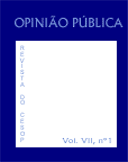Resumo
Apesar do debate sobre os vetores da relação entre confiança interpessoal e democracia, está claro que a confiança interpessoal é a variável central no estudo da cultura política e do capital social. Este artigo examina alguns dos pressupostos básicos das teorias da cultura política e do capital social sobre confiança interpessoal, utilizando dados de pesquisas na América Latina. Em primeiro lugar, analisa quais são os tipos de comportamento político mais fortemente afetados pela confiança interpessoal e em que países essa confiança se correlaciona com mais freqüência com outras medidas de comportamento político que se espera teoricamente que se correlacionem com ela. Em segundo lugar, avalia quais são as variáveis que estimulam a existência da confiança interpessoal naqueles países em que a confiança não exerce uma influência significativa em outras formas de comportamento político. Portanto, a questão que este artigo enfrenta é se a confiança inter-pessoal é importante como elemento definidor do comportamento político, e onde ela é, por que alguns indivíduos mostram níveis mais altos de confiança interpessoal do que outros.
Abstract
Despite the debate about the vectors of the relation between interpersonal trust and democracy, it is clear that interpersonal trust is a central variable in the study of political culture and social capital. This article tests some of the basic assumptions of political culture and social capital debates about interpersonal trust using survey data from Latin America. First it analyzes what are the kinds of political behavior that are more strongly affected by interpersonal trust and in what countries does interpersonal trust correlate with more often with other measures of political behavior that it is theoretically expected to relate with. Second, the article evaluates what are the variables that stimulate the existence of interpersonal trust in those countries where trust does play a significant role in affecting other forms of political behavior. Hence, the puzzle that this article addresses is if interpersonal trust matters as a defining element of political behavior, and where it does, why do some individuals show higher levels of interpersonal trust than others do.
Key words: civic culture, interpersonal trust, political behavior, Latin America
Referências
ALMOND, G. & VERBA, S. (orgs.). (1980) The Civic Culture Revisited. Boston, Little, Brown, and Company.
BAQUERO, M. (1994) Os desafios na construção de uma cultura política democrática na América Latina: Estado e partidos políticos. In: BAQUERO, M. (org.) Cultura política e democracia: os desafios das sociedades contemporâneas. Porto Alegre, Editora da Universidade, pp. 26-42.
BOOTH, J. & RICHARD, P. (1998) Civil Society, Political Capital, and Democratization in Central America, Journal of Politics 60:780-800.
ELSTER, Jon. (1994) Peças e engrenagens das ciências sociais. Rio de Janeiro, RelumeDumará.
INGLEHART, R. (1988) The Renaissance of Political Culture. American Political Science Review, 82(4):1203-29.
INGLEHART, R. (1997) Modernization and Posmodernization: Cultural, Economic and Political Change in 43 Societies, Princeton, Princeton University Press.
KARL, T. L. (1995) The Hybrid Regimes of Central America. Journal of Democracy, 6(3): 124-177.
MULLER, E. N. & SELIGSON, M. A. (1994) Civic Culture and Democracy: The Question of Causal Relationships. American Political Science Review, 88(3):635-654.
NORTH, D. (1995) Institutions, Institutional Change, and Economic Performance. Cambridge, Cambridge University Press.
O’DONNELL, G. (1996) Illusions and Conceptual Flaws. Journal of Democracy, 7(4):161-168.
PUTNAM, Robert. (1996) Comunidade e democracia: a experiência da Itália moderna, Rio de Janeiro, Fundação Getúlio Vargas.
PZEWORSKI, A. & TEUNE H. (1970) The Logic of Comparative Social Inquiry, Nova York, Wiley-Interscience.
RAHN, W. M. & TRANSUE, J. E. (1998) Social Trust and Value Change: The Decline of Social Capital in American Youth, 1976-1995. Political Psychology, 19(3):545-66.
REIS, E. (1995) Desigualdade e solidariedade: uma releitura do “familismo amoral” de Banfield. Revista Brasileira de Ciências Sociais, 29(10):35-48.
SCHEUCH, E. K. (1989) Theoretical Implications of Comparative Survey Research. International Sociology, 4: 147-67.
SELIGSON, A. (1999) Civic Association and Democratic Participation in Central America: A Test of the Putnam Thesis. Comparative Political Studies, 32(3): 342-362.
SELIGSON, M. (1998) The Renaissance of Political Culture or The Renaissance of the (Inverse) Ecological Fallacy? mimeo.
SHAH, D. V. (1998) Civic Engagement, Interpersonal Trust, and Television Use: An Individual-Level Assessment of Social Capital. Political Psychology, 19(3): 469-96.
STOLLE, D. (1998) Bowling Together, Bowling Alone: The Development of Generalized Trust in Voluntary Associations. Political Psychology, 19(3): 497-526.
USLANER, E. M. (1998) Social Capital, Television, and the “Mean World”: Trust, Optimism, and Civic Participation. Political Psychology, 19(3): 441-68.
A Opinião Pública utiliza a licença do Creative Commons (CC), preservando assim, a integridade dos artigos em ambiente de acesso aberto.

